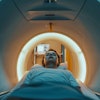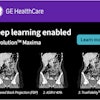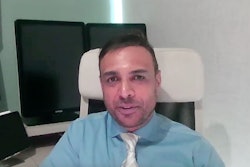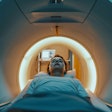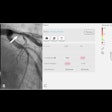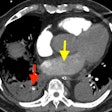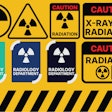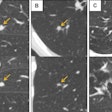Radiology is a dynamic field, evolving continuously as technology advances, and the introduction and rapid deployment of AI is changing the career paths future radiologists may take -- these are among the reasons why medical students Fadi Matar and Johannes Wörsdörfer are keen to specialize in radiology. In an interview conducted by the German Roentgen Society (DRG) at ECR 2025 in Vienna, the duo spoke about how they foresee the field's future.
Matar is due to begin his practical year in medicine in spring 2025 after completing his clinical internship at the University of Vienna; Wörsdörfer has completed his second state medical examination and is currently completing his practical year in radiology at RWTH Aachen University Hospital in Germany.
 Johannes Wörsdörfer (left) and Fadi Matar gained firsthand experience in the world of radiology at ECR 2025. Courtesy of Johannes Wörsdörfer and DRG.
Johannes Wörsdörfer (left) and Fadi Matar gained firsthand experience in the world of radiology at ECR 2025. Courtesy of Johannes Wörsdörfer and DRG.
Matar notes that he originally planned to become a general practitioner; he became interested in radiology after a course in his fifth semester showed him the full interdisciplinary scope of radiology and how important it is for radiologists to be knowledgeable about all organ systems. He then made the decision to pursue it in his final year.
Wörsdörfer says that he became enthusiastic about radiology during an internship he had taken on how to improve his aptitude in radiology for exams. When the internship sparked his interest in the field itself, he was introduced to the DRG’s Brightest Minds Scholarship program, promoting his entry into the field.
Like Matar, Wörsdörfer finds the interdisciplinary nature of radiology intriguing, adding that he is also fascinated by the technology the field uses. Along with working with equipment like CT, MRI, and ultrasound, he is interested in the rapid advances of AI in radiology. He had considered computer science as an alternative to medicine in his studies, he adds.
Both students see AI as a positive driver for change in the field of radiology in the future. Matar notes that friends of his advised against entering radiology due to the uncertainty of future changes that AI might bring. However, while he says he sees AI as being of great and increasing assistance to radiologists, he notes that AI won't supplant radiologists themselves.
Wörsdörfer also considers AI as becoming increasingly indispensable to radiology in providing high-quality patient care.
When asked what has helped them the most in mastering their practical year, both students mentioned videos and interactive materials as important. Both found the "Fit for the Practical Year" preparatory series from the Young Radiology Forum to be helpful in their studies, as well as interactive courses with questions and “learning by doing” sections.
Furthermore, when asked how the DRG could better support students like themselves, Matar suggested offering more interactive courses and materials, allowing students to take a more hands-on approach to learning. Wörsdörfer also said that he would like to see training that offers not only specialist content but also content promoting scientific exchange between fields, as well as promoting radiology more widely to students as a potential path to explore.
You can read the full interview in German here.

